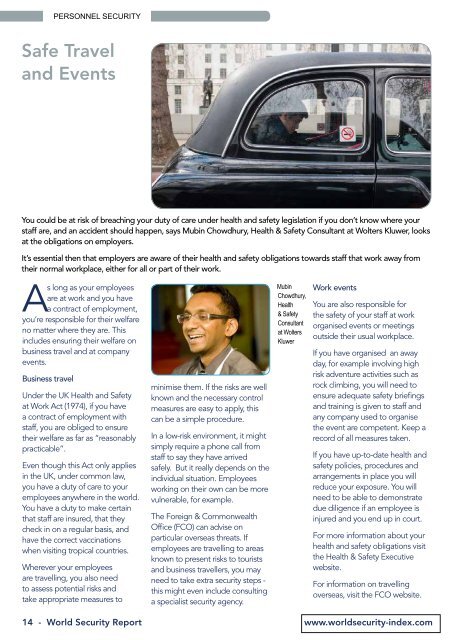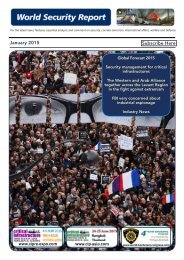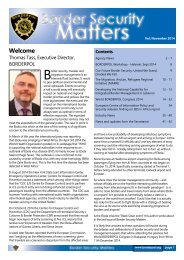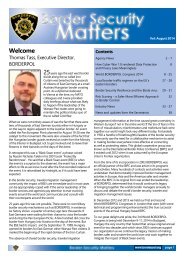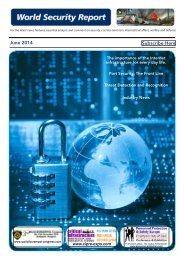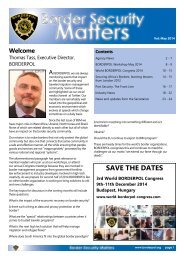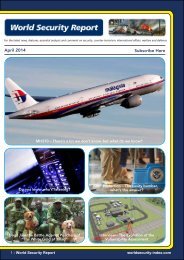September 2014 Subscribe Here
World Security Report September 2014
World Security Report September 2014
Create successful ePaper yourself
Turn your PDF publications into a flip-book with our unique Google optimized e-Paper software.
PERSONNEL SECURITY<br />
Safe Travel<br />
and Events<br />
You could be at risk of breaching your duty of care under health and safety legislation if you don’t know where your<br />
staff are, and an accident should happen, says Mubin Chowdhury, Health & Safety Consultant at Wolters Kluwer, looks<br />
at the obligations on employers.<br />
It’s essential then that employers are aware of their health and safety obligations towards staff that work away from<br />
their normal workplace, either for all or part of their work.<br />
As long as your employees<br />
are at work and you have<br />
a contract of employment,<br />
you’re responsible for their welfare<br />
no matter where they are. This<br />
includes ensuring their welfare on<br />
business travel and at company<br />
events.<br />
Business travel<br />
Under the UK Health and Safety<br />
at Work Act (1974), if you have<br />
a contract of employment with<br />
staff, you are obliged to ensure<br />
their welfare as far as “reasonably<br />
practicable”.<br />
Even though this Act only applies<br />
in the UK, under common law,<br />
you have a duty of care to your<br />
employees anywhere in the world.<br />
You have a duty to make certain<br />
that staff are insured, that they<br />
check in on a regular basis, and<br />
have the correct vaccinations<br />
when visiting tropical countries.<br />
Wherever your employees<br />
are travelling, you also need<br />
to assess potential risks and<br />
take appropriate measures to<br />
minimise them. If the risks are well<br />
known and the necessary control<br />
measures are easy to apply, this<br />
can be a simple procedure.<br />
In a low-risk environment, it might<br />
simply require a phone call from<br />
staff to say they have arrived<br />
safely. But it really depends on the<br />
individual situation. Employees<br />
working on their own can be more<br />
vulnerable, for example.<br />
The Foreign & Commonwealth<br />
Office (FCO) can advise on<br />
particular overseas threats. If<br />
employees are travelling to areas<br />
known to present risks to tourists<br />
and business travellers, you may<br />
need to take extra security steps -<br />
this might even include consulting<br />
a specialist security agency.<br />
Mubin<br />
Chowdhury,<br />
Health<br />
& Safety<br />
Consultant<br />
at Wolters<br />
Kluwer<br />
Work events<br />
You are also responsible for<br />
the safety of your staff at work<br />
organised events or meetings<br />
outside their usual workplace.<br />
If you have organised an away<br />
day, for example involving high<br />
risk adventure activities such as<br />
rock climbing, you will need to<br />
ensure adequate safety briefings<br />
and training is given to staff and<br />
any company used to organise<br />
the event are competent. Keep a<br />
record of all measures taken.<br />
If you have up-to-date health and<br />
safety policies, procedures and<br />
arrangements in place you will<br />
reduce your exposure. You will<br />
need to be able to demonstrate<br />
due diligence if an employee is<br />
injured and you end up in court.<br />
For more information about your<br />
health and safety obligations visit<br />
the Health & Safety Executive<br />
website.<br />
For information on travelling<br />
overseas, visit the FCO website.<br />
14 - World Security Report www.worldsecurity-index.com


